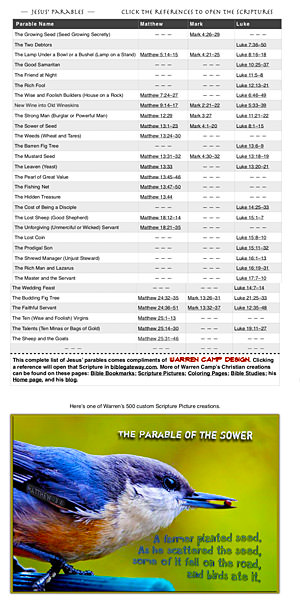
Jesus’ parable was told by Jesus, directly to his disciples, to illustrate the necessity of forgiveness and mercy. He’d already told his listeners the Parable of the Lost Sheep. Then, after Peter asked him how often he must forgive someone who sins, Jesus told this parable.
In it, the first servant owed an enormous sum of money but was forgiven that incredible debt. However, he couldn’t bring himself to forgive his neighbor of a very small debt. The contrast couldn’t have been greater!
We find this parable only in Matthew’s gospel: chapter 18, vv. 23–35. In this judgment-specific parable, Jesus also teaches today’s disciples about the "kingdom of heaven."
Incidentally, Jesus spoke about the heaven-or-hell judgment more than anyone else in the Bible and in a very specific way. More than half of the parables that Jesus told relate to God’s eternal judgment of sinners.

† Find Warren’s short summary at the bottom of page.
Click the list or the “bird” to enlarge and use Warren’s list of forty-four of Jesus’ parables (a PDF file with links to Scriptures).
Start Reading Warren’s Commentary . . .
Find his summary at the bottom.
par•a•ble [noun] a simple story used to illustrate the meaning of or a moral or spiritual lesson, as told by Jesus in the gospels
synonyms: allegory, moral story/tale, fable
Jesus’ Parable of the Unforgiving / Unmerciful Servant
Matthew 18:21–35
Today’s parable follows the Parable of the Lost Sheep (Matthew 18:10–14), which we covered in this summary. We ought to take some very important principles from today’s parable and consider how to best apply them to our daily living.
Jesus used parables to teach. Speaking in parables, he intentionally separated those with attentive ears from those with hardened hearts (Matthew 13:10–17).
This particular parable, which compares the kingdom of heaven to a king who was intent on settling his debts, isn’t particularly difficult to understand and appreciate, unlike these "kingdom" parables: the Lost Sheep, which is counter-intuitive; the Sower, which needs explanation in the text of the gospel itself; the Mustard Seed and Yeast, short yet relevant only to the local culture; and the Hidden Treasure, which is almost nonsensical).
We’ll meet three key characters who are represented in this challenging forgiveness-specific parable, and learn what their responsibilities were and what the consequence was for failing to forgive, especially when one had already been forgiven. This video modernizes the elements of this forgiveness lesson very well.
A dramatization of the "Unmerciful/Unforgiving Servant" parable
The Parable of the Unforgiving/Unmerciful/Unjust Servant
A Parable of Judgment, Related to the Requirement to Forgive
To understand, appreciate, and apply this parable meaningfully, we must first put into context the telling of this parable. Jesus directed it to his inner circle of twelve disciples; it wasn’t meant to confuse or challenge the thinking of the crowds. He introduced it in direct response to Peter’s question about the nature and need for forgiveness. Whatever the rhetorical reason(s) might be, this parable is relatively clear: We’re exhorted to fully forgive others, just as we’ve been fully forgiven by Father God.
So, Who’s Who?
Jesus introduced his disciples (and us his readers) to three primary characters: There’s a king, a servant who owed the king a considerable amount of money, and a servant of the first servant, who owed that first servant a small amount of money.
— The king in this parable represents the King (with a capital "K"): God the Father. As the video that’s linked above illustrates, God the King is something of a banker who’s taking account of those who have an indebtedness to him.
— The first servant in this case is one of the King’s servants. He owed Him a huge amount: 10,000 talents, which in those days amounted to about 20 years of a day laborer’s annual wages!
— The second servant owed the first servant a small amount comparably: 100 denarii coins. A denarius was the usual daily wage of a laborer (20:1–2). Then, it amounted to the pay a laborer received for 100 days of work; today, 100 denarii would have an approximate value of $16.
The king in this parable expected his servants to be faithful and honorable in the way they conducted his business. Therefore, one day he examined their work in order to settle accounts with them. Regarding the amount that the first servant owed the king — 10,000 talents — commentators list the modern value of that many talents to be anywhere between $12 million and $1 billion. The figure clearly represents a debt that couldn’t be paid by a day laborer.
In order to have this money returned to him, the king ordered that the first servant be sold, along with his family and everything he owned. He and his family would be relegated to becoming indentured slaves, likely for the rest of their lives. The king or master of that servant was moved with compassion so he released him and forgave his entire debt: The master showed mercy prompted by compassion, forgiving a debt that obviously could never be repaid, despite whatever promises the servant made. The servant who’d just been forgiven an enormous debt went out and found one servant who owed him money. Upon meeting him, he immediately assaulted him (grabbed him and began to choke him) and demanded payment (v. 28). His debt to the first servant was real: 100 denarii was roughly equal to 100 days wages, which wasn’t an insignificant amount, but it was almost nothing, compared to the gigantic debt that his master had graciously forgiven.
We see in vv. 31–34 the judgment of the unforgiving first servant. There is no mention in the parable of the first servant’s conscience bothering him about his conduct. It was his fellow servants who recognized the wrong that had been done. When the master heard of this he was understandably angry. It was just wrong for a man who’d been forgiven so much to then be so unforgiving. So the king gave the first servant what he deserved: justice instead of mercy.
The first servant whose king forgave him much (10,000 talents), equivalent today to several-million dollars, was unwilling to forgive his fellow servant who owed him a mere hundred denarii, which, compared to what the first servant was forgiven, was a very small amount. The principle here is, “the one forgiven much is also responsible to forgive much.” In other words, the principle of forgiveness is based on extending our grace or forgiveness to another without any limit. Jesus’ disciples then and today aren’t to count the number of times they’ve forgiven someone. Rather, we’re to forgive much or fully because God has forgiven much or fully.
Forgiveness is presented in this parable as both an extravagant and a precious thing. And throughout Matthew’s gospel, forgiveness is to be reciprocal and reliable. When teaching his disciples to pray, Jesus would have us say, “And forgive us our debts, as we also have forgiven our debtors” (6:12). That specific petition of the Lord’s Prayer is echoed in this parable’s lesson about the kingdom, reflecting it back in reverse: We must forgive others the same way and extent that our King has forgiven us: fully!
Because God has forgiven us immeasurably, we’re to forgive others equally. Therefore, because we’ve received much grace from Jesus, he commands us to give back that same amount of grace to others. In the Parable of the Unforgiving Servant, the first servant’s huge debt was entirely forgiven; he was no longer required to repay, until his unforgiving nature was discovered. In contrast, our sin debt was paid in full by Christ; it’s the only basis for God’s forgiveness.
Jesus taught his disciples that forgiveness — both the giving of it and the receiving of it — is reciprocal: One cannot receive forgiveness without offering it to others. “For if you forgive other people when they sin against you, your heavenly Father will also forgive you. But if you do not forgive others their sins, your Father will not forgive your sins” (Matthew 6:14–15). In answering Peter’s request for help in understanding how far forgiveness needs to go, Jesus informed him that God’s forgiveness surpasses the amount we deserve and our ability to comprehend it; we who’ve first been forgiven must, therefore and thereupon, forgive those who’ve harmed us, especially those who’ve wronged us more lightly.
A Hearty Way to Apply This Parable Today
The point of this parable is clear and its demands are urgent: Forgiveness lies at the heart of our faith in God and our love of one another. It’s that forgiveness, which we receive from God our King in the person of Jesus, that our King expects from every one of his servants to offer others in our dealings with one other.
Therefore, in the Parable of the Unforgiving / Unmerciful / Unjust Servant, Jesus taught his disciples that forgiveness should be in like proportion to the amount forgiven. The first servant had been forgiven all; he should have forgiven all. In like manner, a child of God, by faith through Christ, has had every sin forgiven. Therefore, when someone offends or sins against us, we should be willing to forgive him or her with a heart of gratitude, for the grace to which we ourselves owe others.
“And forgive us our debts, as we also have forgiven our debtors.” When praying that essential prayer element, we’re to emphasize all that we’ll receive in response to the extent of forgiveness we offer people. Look now and linger on the closing verse of this parable.
“This is how my heavenly Father will treat each of you unless you forgive your brother or sister from your heart” (v. 35).
Forgive your brother or sister from your heart. Jesus’ forgiveness parable turns the tables, teaching us that, because we’ve first been forgiven, we’re encouraged to forgive people in return. Taken together, this is a composite picture of the kingdom of heaven, and the kingdom here on earth in which we practice heart-felt acts of love that are driven by forgiveness.
Do not be spiteful. Have a heart; judgment time is coming. God forgives. So must we forgive, amen!
Genuine forgiveness, from the heart, is required of all who’ve been forgiven.
“This is how my heavenly Father will treat each of you unless you forgive your brother or sister from your heart” (Matt. 18:35).

Take our “Parables Quiz.”
See Warren’s other “Parables of Jesus” commentaries.
— Warren’s Concise Summary —
Jesus’ Parable of the Unforgiving (Unmerciful) Servant begins when Peter asks how many times he must forgive a brother who sins against him, and Jesus answers with “seventy-seven” (or “seventy times seven”). It then illustrates this with a story about a king settling accounts with his servants.
One servant owes a huge unpayable debt, begs for patience, and the king, moved with compassion, cancels the entire amount. That same servant then refuses to forgive a fellow servant who owes him a comparatively tiny sum, has him thrown into prison, and is subsequently condemned by the king, who reinstates his punishment, with Jesus warning that the heavenly Father will treat unforgiving people likewise unless they forgive their brothers and sisters from the heart, showing that those who receive great mercy are expected to extend forgiveness generously to others.

